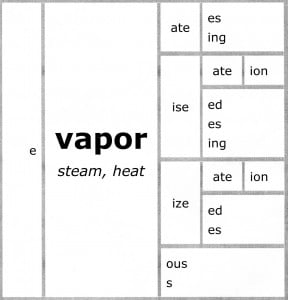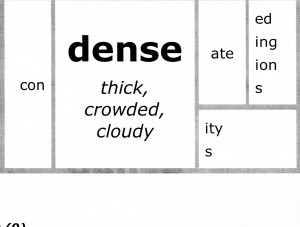I decided to give a quiz of sorts on Monday of this week. I asked the students to write the word <prejudice> on one side of the paper, and <segregation> on the other. These are words that we have investigated in the last two weeks. For each I wanted:
1) the definition
2) a word sum
3) two other word sums showing the base with other affixes
4) two words with related meanings
I learned much! The vast majority of the students spelled both words correctly, but the vast majority did not write an accurate word sum for that spelling. For some of my students the tendency is to divide words by syllables rather than bases and affixes. This makes for some random word sums as their hypothesis! Even though they have knowledge about certain prefixes and suffixes, they aren’t applying that yet on an automatic basis. I’m confident that as the investigations continue, and they talk about why they are making the choices they are making, that this will all come together.
Today we split into four groups. Two groups investigated <evaporation> ,and two groups investigated <condensation>. Rather quickly, both groups looking at <evaporation> found the base element to be <vapor>. We all found out that <e> is from the prefix <ex> which means out. That really helped with picturing evaporation! Students used their hands to describe the vapor moving in an outwards direction.
The suffixes <ise> and <ize> in the matrix for the base <vapor> reminded us of the books we read by Roald Dahl earlier in the year. As we read we collected spellings that were slightly different than what we were used to. We remembered the word <realise>, which we knew was a British English spelling rather than what we are used to – American English spelling.
The two groups investigating the word <condensation> approached it quite differently. The first group began with a pretty accurate word sum hypothesis. Then they looked up <condensation> and <dense> to find out more. With prompting they added the meaning of the prefix to their understanding of the base.
The second group was trying all sorts of random letter combinations as part of their word sum hypotheses. At first it didn’t seem as if they had a plan, meaning a logical order for how to proceed with their investigation. When I asked if they had looked on their list of proven prefixes to see if anything matched what they were seeing in the word, things began to click.



Amazing how your students are now thinking about words! Isn’t critical thinking the goal of teaching? It certainly is the result of Real Spelling!
I’m really happy that we’re doing orthography stuff rather than spelling. I never really have been a big lover of spelling. I hope you can do this with your next year class too, as well as the other fifth grade teachers! I’m sure they will love it as much as we do.
This is such an in + spire/ +ing post. The fact that you are providing your students with these kinds of learning opportunities is so exciting. I almost wonder whether some who see that you are so new to this understanding yourself might see some kind of “conspiracy” going on.
The fact is, of course that nothing motivates learning like a true understanding.
I am particularly pleased that the word “condensation” proved so rich for your learning. It turns out that I have long pointed to a beautiful investigation of this word by a friend in a public school here in Kingston, Ontario. You and your readers can see that account at this link if you wish: The fact that this way of understanding of how spelling works is new to you, and your readers can follow the trail of the learning of that class at this link: http://wordworkskingston.com/WordWorks/Investigation_of__condensation_.html
You might even find an answer to one of the Old Grouch’s question from Grade 4/5 students if you do.
Many thanks to you and your students for breathing even more life into the world-wide understanding of English spelling around the world!
There are so many excellent points in these investigations, not least of which is that they really are:
in + vestige/ + ate/ + ion + s
The denotation of the base element ‘vestige’ is “footprint”; being real word sleuths is all about finding the tracks and then following them. The same idea is behind the word ‘learn’ – check it out in Etymonline.
Answers are much less important than the real scientific business if framing, posing and following up questions. One of the best learning experiences is following a track and then finding that it takes us to a dead end. We then have the pleasure of retracing our steps to discover where it was that we took the wrong turning, and then setting out on a more likely line. That’s what real scholars do and these students (the bound base element ‘stude’ denotes “eager to learn”) are rapidly becoming real scholars. Scholars always try to identify what we don’t know; only after that can we really begin to learn.
One thing that I hope you don’t (yet!) know is why there MUST be a final ‘e’ in the free base element ‘dense’ – and it’s absolutely nothing to do with pronunciation. See if you can track that reason down.
—–
Now that you are all engaging in real orthographic analysis it is inevitable that you are finding out for yourselves that the ’syllabication’ ideology for English is entirely false. The syllable division ideology is not only in total disjuncture with the real conceptual structure of orthography; it is also conceptually incoherent within its own postulations and assumptions. It puts learners on the wrong path, facing the wrong direction, with the wrong map.
Certainly, in most languages there is a near exact correspondence between spoken an written syllables so there is rarely need to discuss them separately. But that is just not the case in English because:
• it has different types of spoken syllable;
• there are also different types of written syllable;
• English syllables can only be counted, not safely and consistently divided;
• there is no fixed correspondence in words between their spoken and written syllables either in number or in boundary.
You can download a fully comprehensive account of what the English syllable really is, and why the ‘syllabication’ ideology is an overarching carapace of fallacy, incoherence and confusion, from this link.
https://www.dropbox.com/s/yihr6umgc32ouy7/Syllabosilliness.iso
It’s in the form of a .iso disk image.
Your work is really inspiring, and through your blog you are giving rich ecouragement to real spellers all over the world.
And you only started a few weeks ago; amazing!